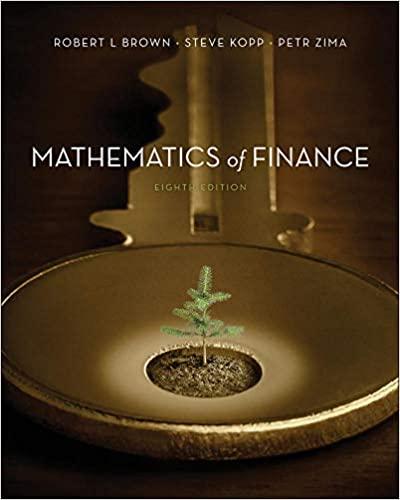Question
Using the constant-growth method for our Dividend Discount Model (DDM), find the intrinsic value of a share of Walt Disney Company stock. To do so,
Using the constant-growth method for our Dividend Discount Model (DDM), find the intrinsic value of a share of Walt Disney Company stock. To do so, enter DIS in the Quote box of the Morningstar site and be sure that the Quote section is selected in the company option bar. You will need to find the most recent annual dividend and beta. You may assume that Disneys growth rate in dividends and earnings is 9%. For the appropriate discount rate (k), you will need to compute the required rate of return on Disney using the Security Market Line (SML) of the CAPM. So, you need to find the risk-free rate of return (use the Yield to Maturity of the 10-year T-Note) and you may assume that the expected return on the market for the next period is 8%. Question: What is Disneys required rate of return according to the SML of the CAPM?
For the appropriate discount rate (k), you will need to compute the required rate of return on Disney using the Security Market Line (SML) of the CAPM. So, you need to find the risk-free rate of return (use the Yield to Maturity of the 10-year T-Note) and you may assume that the expected return on the market for the next period is 8%.
What is Disneys required rate of return according to the SML of the CAPM?
What is the intrinsic value of a share of Disney stock according to the DDM? Is it under or overvalued?
Suppose that the expected return on the market portfolio is 9% (rather than 8%). What is our new valuation? Is it over or undervalued?
Is the stock price in the market currently overvalued or undervalued?
Suppose that Disneys growth rate in dividends turns out to be a constant 8% (rather than 9%). Using the original 8% expected return on the market, what is the new valuation? Is it over or undervalued?
What can we conclude will happen to our valuation following an increase in the expected return on the market? what will happen to the valuation following a decrease in expected return?
What can we conclude about the validity of the Dividend Discount Model (DDM)?
The yield of T note not given in question....this is the whole question....
Step by Step Solution
There are 3 Steps involved in it
Step: 1

Get Instant Access to Expert-Tailored Solutions
See step-by-step solutions with expert insights and AI powered tools for academic success
Step: 2

Step: 3

Ace Your Homework with AI
Get the answers you need in no time with our AI-driven, step-by-step assistance
Get Started


